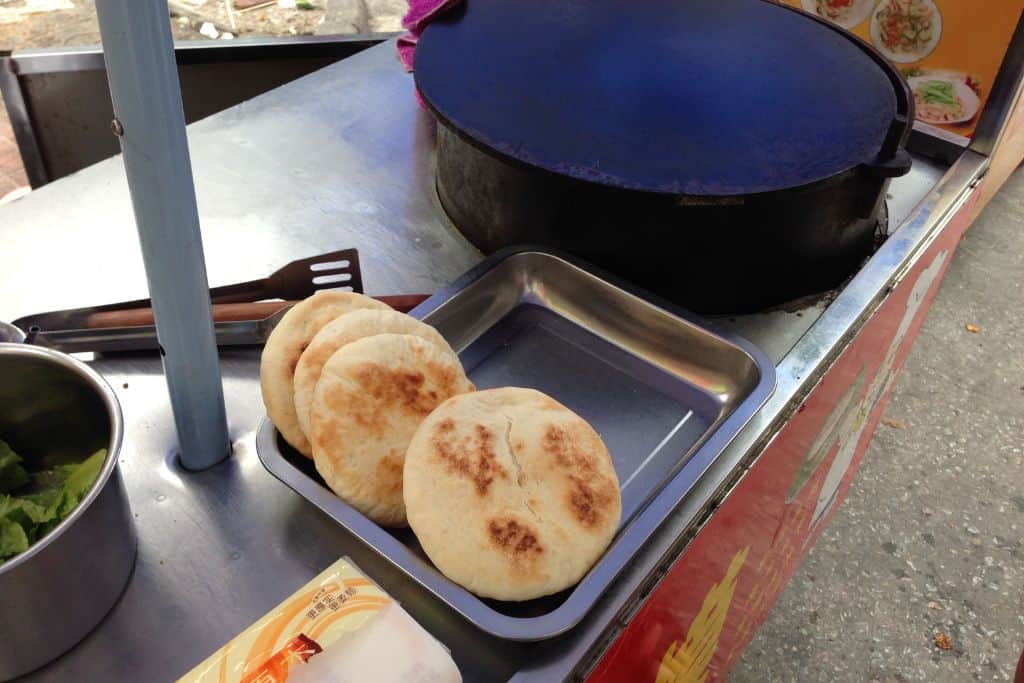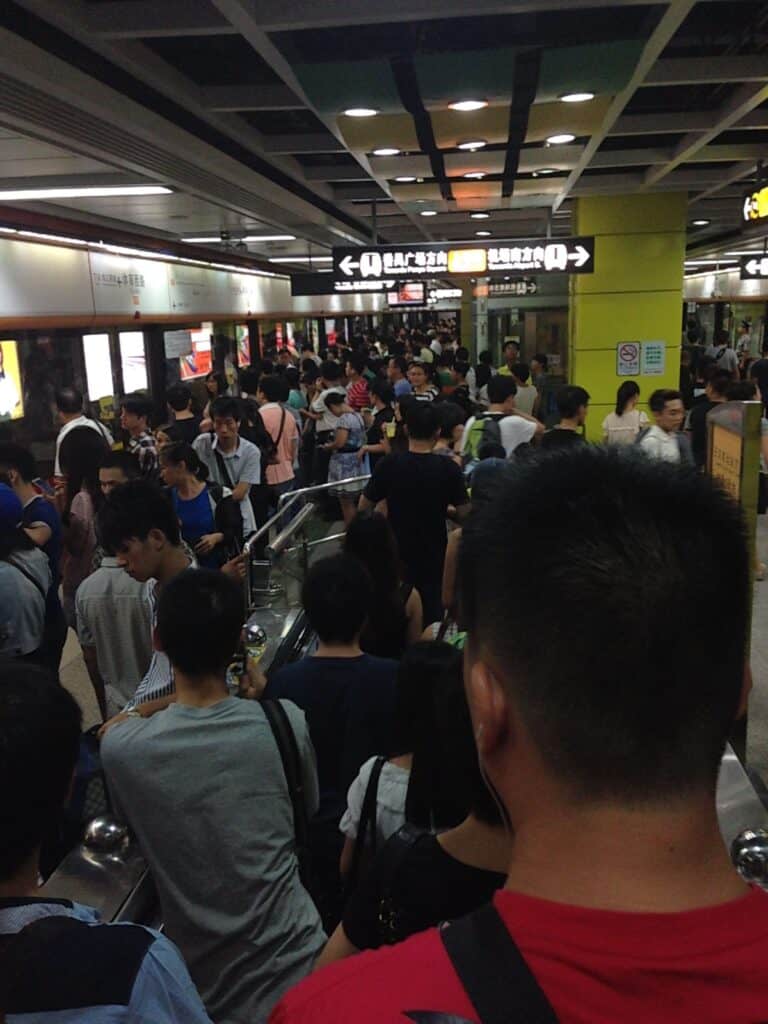Is It Safe to Travel Around China?
Traveling as a solo female is more popular than ever before. I’ve visited and lived in China and the number one question I got asked the most, “Is it safe to travel around China?”
As someone who has been there, done that, I can say I never felt in danger. I truly believe it is safe to travel around China provided you follow common sense and the following tips.
Learning to keep yourself safe is critical for any woman traveling on her own. This applies no matter which country you find yourself in.

Is It Safe to Travel Around China? 10 Tips to Help You
China is generally considered a safe destination for solo female travelers, but it’s always wise to take certain precautions. Follow these 10 tips to make sure you feel safe to travel around China. Some of these may seem simple, but that is often the case when it comes to solo female travelers. Use your head!
1 Stay Aware of Your Surroundings
Always trust your instincts. If something feels off, it’s okay to leave the area or seek help from local authorities or trusted individuals.
This tip emphasizes the importance of situational awareness.
While exploring new places in China, whether bustling cities like Beijing and Shanghai or smaller towns, always be mindful of your surroundings. Pay attention to the people around you and the atmosphere of the location. If something feels uncomfortable or out of place, it’s okay to remove yourself from the situation.
This could mean stepping into a nearby shop, returning to your hotel, or finding a safe place with more people around.
It’s also wise to familiarize yourself with local emergency numbers and identify nearby places. Police stations, hospitals, or embassies are where you could seek help if needed.
Staying aware also includes being cautious about your belongings and avoiding displaying valuables that could attract unwanted attention.
2 Stay Connected to Feel Safe to Travel Around China
Use a reliable local SIM card or portable Wi-Fi device to ensure you’re always connected. This helps with navigation, communication, and contacting emergency services if needed.

Having access to the internet while traveling is crucial for navigation, communication, and safety. In China, getting a local SIM card or a portable Wi-Fi device is relatively easy and can be done at major airports or convenience stores.
Staying connected allows you to use maps for directions, look up information, and communicate with others. All of this is particularly important if you find yourself lost or in an unfamiliar area.
Additionally, many ride-sharing apps, translation tools, and emergency services require an internet connection. Being online also helps you stay in touch with friends or family back home. Keep them informed of your whereabouts and ensure someone knows your plans, which adds an extra layer of security.
3 Use Safe Transportation
Choosing safe and reliable transportation is key to ensuring your safety while traveling in China. Stick to licensed taxis that can be found at designated taxi stands or hailed via reputable hotel services.
Using ride-sharing apps like DiDi, the Chinese equivalent of Uber, provides an added level of security because these apps track your ride with GPS. DiDi also has safety features such as emergency contacts, trip sharing, and an in-app panic button.

Before getting into any taxi or ride-share vehicle, check the driver’s details and vehicle license plate to ensure they match what the app shows. Stay safe and use common sense. Always sit in the back seat and keep your belongings close to you.
If you’re using public transportation, be mindful of pickpockets, especially in crowded buses and subway stations, and avoid traveling late at night or during times when public transport is less frequent.
4 Research Accessibility
If you have physical limitations or mobility concerns, it’s crucial to research accessibility options in advance to ensure a smooth travel experience in China.
Start by looking for hotels or accommodations that specifically mention accessibility features. These include elevators, ramps, wider doorways, and accessible bathrooms. Many international hotel chains in larger cities like Beijing, Shanghai, and Guangzhou offer these amenities.

For public transportation, familiarize yourself with the accessibility features of the metro systems in major cities. Beijing, for instance, has a relatively accessible metro with elevators and accessible exits at many stations. Newer metro systems in cities like Guangzhou and Shanghai also include accessibility features.
For long-distance travel, Chinese high-speed trains are a good option as they are generally equipped with accessible toilets and wheelchair spaces.
If you’re planning to visit tourist attractions, check their websites or contact them directly to inquire about accessibility options such as ramps, elevators, or accessible restrooms.
Planning ahead ensures that you have a clear idea of what to expect. It helps you avoid any potential difficulties during your trip.
Stay in Reputable Accommodations
Choose well-reviewed hotels or hostels, preferably in central and well-lit areas. Guesthouses and hostels in China often have friendly staff who speak some English and can offer helpful advice.
5 Dress Modestly
Dressing modestly in China is both a sign of respect and a way to avoid unwanted attention. This is especially true in rural areas or places with conservative cultural practices
While larger cities like Beijing and Shanghai are generally more cosmopolitan and diverse in terms of dress, smaller towns and rural regions may have different norms.
It’s advisable to wear clothing that covers your shoulders and knees, especially when visiting temples, religious sites, or traditional villages. This not only shows respect for local customs but also helps you blend in more seamlessly with the local culture, reducing the chances of drawing unnecessary attention.

Loose, breathable clothing made from natural fibers can keep you comfortable in China’s varying climates. This ranges from the humid summers in the south to the cold winters in the north. Bringing a scarf or shawl can also be useful for covering up when needed. It’s practical for shielding against sun or chilly air-conditioned environments.
While China is quite modern in many ways, modest dress is generally appreciated, especially in less urban areas. This can help you blend in and avoid unwanted attention. I’m not saying you cannot dress as you wish.
However, if you don’t want to draw unnecessary attention to yourself, cover up a bit more, especially your arms and chest. Many Chinese women show off gorgeous legs in a short skirt or shorts. Yet they still cover up their arms and chest area out in public.
6 Learn Basic Mandarin Phrases
Knowing a few key phrases or using a translation app can greatly assist in communication and make interactions smoother.
Learning a few basic Mandarin phrases or having a reliable translation app can significantly enhance your travel experience in China.
Knowing simple phrases like “hello” (你好, nǐ hǎo), “thank you” (谢谢, xiè xie), “yes” (是的, shì de), and “no” (不是, bù shì) can go a long way in everyday interactions. Show locals that you are making an effort to engage with their culture.
Mandarin is the most widely spoken language in China, and while English is common in larger cities, it may not be as prevalent in smaller towns or rural areas.

A translation app can help bridge any language gaps, especially when reading menus, asking for directions, or communicating in emergencies. Apps like Google Translate or Pleco can provide offline translations, which are particularly helpful in areas with limited internet access.
By making an effort to communicate in Mandarin, you’ll find that people are often more willing to engage with you. Create more meaningful and positive interactions.
7 Carry Photocopies of Important Documents
Keep photocopies of your passport and visa in a separate location from the originals. Protect your identity in case of theft or loss.
It’s essential to have photocopies of your important documents. This includes your passport, visa, and any travel insurance details, in case of theft, loss, or an emergency. Keep these copies in a separate location from the originals—ideally in a secure, easily accessible place like a hotel safe or a hidden pocket in your luggage.
Having these copies readily available can significantly expedite the process if you need to replace your documents at a local embassy or consulate.

Additionally, consider taking digital photos of your documents and storing them securely on your phone or in a cloud-based service. Google Drive or Dropbox, can be accessed anywhere.
This redundancy ensures you have multiple ways to prove your identity. It can help in cases where official documents are required for police reports, entry to certain locations, or booking accommodations.
8 Use Anti-Theft Bags
Consider using a money belt or cross-body bag with anti-theft features like slash-proof straps to keep your belongings secure.
To protect your belongings from theft, consider using bags with built-in security features. Anti-theft bags typically come with lockable zippers, slash-proof straps, and RFID-blocking compartments to protect your credit cards and passports from electronic theft.

Cross-body bags are particularly recommended because they are harder to snatch compared to shoulder or tote bags. When walking in crowded areas such as markets, public transport, or tourist sites, keep your bag in front of you with your hand over the zipper to deter pickpockets.
For additional security, consider using a money belt or neck pouch. This keeps valuables like cash, cards, and passports close to your body and out of sight. If you’re traveling with a backpack, use a small lock to secure the zippers, making it more difficult for someone to open the bag without your knowledge.
These simple precautions can greatly reduce the risk of theft and give you peace of mind while exploring.
9 Choose Safe Dining Options
Opt for busy, well-reviewed restaurants or street food stalls to minimize the risk of foodborne illnesses.
Food is a big part of the travel experience in China, but it’s important to be mindful of where and what you eat to avoid foodborne illnesses. Stick to busy, well-reviewed restaurants or food stalls, as high turnover usually indicates fresher ingredients.

However, when dining at street food stalls, choose ones where you can see the food being prepared and cooked thoroughly in front of you. Be cautious with raw or undercooked foods, especially seafood or meat. Also be careful with fresh fruits and vegetables that may have been washed in unfiltered water.
Bottled water is recommended over tap water. Avoid ice in drinks unless you are sure it was made from purified water.
Additionally, be aware of food hygiene practices in the places you eat. Look for clean kitchens and food handlers wearing gloves or using utensils rather than their hands. If you have dietary restrictions or food allergies, learn how to communicate these in Mandarin. This ensures your food is prepared safely.
10 Register with Your Embassy
Upon arrival, register with your embassy and have their contact information handy for emergencies.
Before or upon arrival in China, register with your home country’s embassy or consulate. Most embassies offer a registration service that allows them to keep track of their citizens in case of an emergency, such as a natural disaster, political unrest, or health crisis.

Registration often involves providing your contact details, travel itinerary, and emergency contact information. This service ensures that the embassy can reach you and offer assistance if needed.
Additionally, knowing the location and contact details of your embassy or consulate can be incredibly useful for a range of services, including replacing lost or stolen passports, providing notarial services, and offering advice in the event of a legal issue.
Some embassies also provide travel alerts and updates. These can help you stay informed about any potential safety concerns during your stay in China. Keeping their contact information handy and knowing how to get to the nearest embassy or consulate is a smart move for any traveler.
Following these tips can help ensure a safer and more enjoyable travel experience for women exploring China.
To learn more about traveling in China, check out these posts.
Important Tips for Traveling to China Navigating the Great Wall of the Work Visa in China Canton Tower - A Symbol of Progress and Prosperity in Guangzhou Traveling Solo to Yangshuo China Travel Visa to China - Which One Do You Need? Zhujiang New Town - Where Culture, Commerce, and Cuisine Collide
Transportation Tips to Be Safe to Travel Around China
For many solo female travelers, getting from one place to another is an important part of the adventure. Here are additional transportation tips for the subway, taxis and ride-shares, and buses.
Key Features of Chinese Subway Systems
The subway systems in China are some of the most extensive, efficient, and modern in the world. Here’s what you need to know about using the subway in China.
Extensive Networks
Major cities like Beijing, Shanghai, Guangzhou, Chonqing, and Shenzhen have vast subway networks that cover nearly all major districts and tourist attractions. Even smaller cities often have well-developed metro systems.
Modern and Clean
The subway trains and stations are generally very clean and well-maintained. They are equipped with modern amenities such as air conditioning, electronic maps, and digital announcements in both Chinese and English. Lighting is also good, creating a safer-feeling environment for everyone.

Security Checks Keep You Safe to Travel Around China
Before entering the subway stations, passengers are required to go through a security check. This usually involves placing bags through an X-ray machine and occasionally having them manually inspected. This process is generally quick and efficient but can cause minor delays during peak hours.
English Signage
Most subway stations have signs and announcements in both Chinese and English, making navigation easier for non-Chinese speakers. Even if the words are unfamiliar, you should be able to recognize the names.

Subway maps are also widely available in stations and can be found on various apps.
Tips for Using the Subway Safely in China
Many major cities have extensive subway systems. These subways are the easiest way to get around congested cities. Follow these tips to be safe to travel around China.
Avoid Rush Hours
Chinese subways can get extremely crowded during peak hours, typically between 7:30–9:30 am and 5:30–7:30 pm on weekdays. If possible, plan your travel outside these times to avoid the crowds.

Keep an Eye on Your Belongings
Although subways in China are generally safe, pickpocketing can occur in crowded areas. Keep your bag zipped and in front of you, and be mindful of your belongings.
I actually dropped several hundred yuan in the subway station getting out of a train. As I went up the escalator, at least 3 people came running to let me know the money fell from my pocket. They handed it back to me. I was stunned at the way they were all looking out for me, the obvious foreigner.
Although I never felt any concerns from Chinese people in the subways, it’s still better to keep your belongings secure in a crowded subway station.
Know Your Route
Subway maps are available at stations. Apps like Baidu Maps and Google Maps (using a VPN) can provide detailed directions. Knowing the line number, direction, and station names in advance will make your journey smoother.
Accessible Features
Most larger subway stations have elevators and escalators, making them accessible for people with mobility issues. There are also designated seats for elderly passengers, pregnant women, and those with disabilities.
Dedicated Women’s Cars
In some cities, during peak hours, there are women-only cars to ensure safety and comfort for female passengers. Look for signs indicating these cars if you prefer to use them.
Overall, the subway systems in China are a reliable and efficient way to get around. With a bit of preparation, you’ll find them an easy and convenient mode of transportation for exploring the country.
Taxi and Ride-Share Safety Tips in China
Knowing these tips will help you stay safe to travel around China.

Be Cautious with Taxis and Ride Shares
Use official taxis and insist that the meter is turned on. Paying according to the official meter amount prevents surprises when faced with an unexpected high charge from an unofficial taxi.
In recent years, ride-hailing apps like Didi have become very popular in China. They have safety features such as real-time GPS tracking, and it’s generally safe to use them if you prefer. However, ensure you’re using the official app and not accepting rides from unofficial drivers.
General Tips for Bus Travel in China
Buses cross the cities and often travel out to the more rural parts outside of the metropolitan areas. Here are some tips to help you feel safer as you travel by bus.
Language Support
It can be helpful to have a translation app or written instructions in Chinese for your destination. Some bus station staff may not speak English, especially in smaller cities.
Travel During the Day
If possible, especially for first-time travelers, consider traveling during the day. Get familiar with the routes and you can reduce the stress of navigating a new environment in the dark.
Patience and Flexibility
Chinese bus stations can be hectic, especially during peak travel times or holidays. It’s good to stay patient and flexible, and perhaps allow some extra time for unexpected delays or changes.
I can also suggest making a friend that can help you navigate the bus stations. Many young college aged students speak some English. They enjoy conversing with English-speaking folks, so take advantage of that. Have a nice conversation and get some much-needed assistance if you want it.
Safety Considerations
While generally safe, it’s important to choose reputable bus companies, especially for long-distance routes. Bus drivers can sometimes drive aggressively, and road conditions may vary, especially in rural areas.




